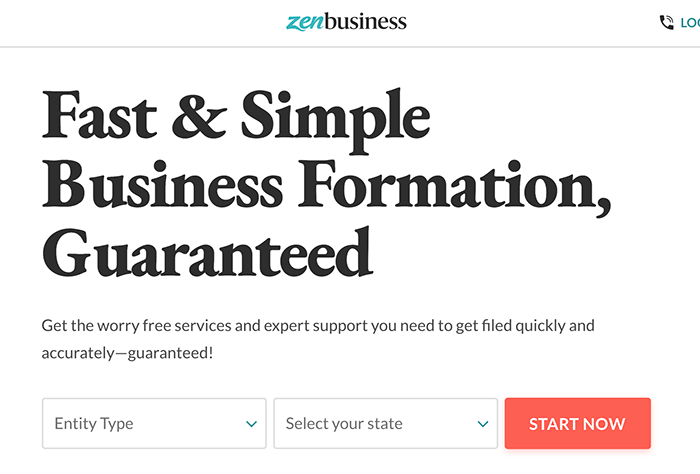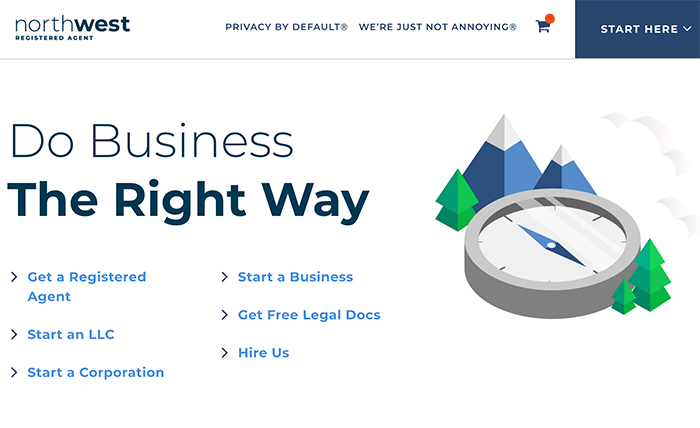Limited liability corporations, usually called LLCs, are an attractive option for business owners. This is mostly because they protect the business owner from personal liability for the business.
Historically LLCs have been an attractive financial option for established Baby Boomers who have personal assets they want to protect. In more recent years, Gen X and Millennials are exploring entrepreneurial partnerships.
GenX holds 38.4% of national student loan debt and 14.8 million millennials are paying off student loans. Their total debt is over $1.1 billion dollars. In these situations, an LLC structure prevents a partner with high student loan debt from threatening the stability of the new business.
The costs of starting an LLC vary widely by state, and it’s important to catch all the financial details to avoid penalties. An LLC is the easiest way to protect assets when starting a business, and with a little research, you can find the least expensive way to get started.
What Are LLC Startup Costs?
Every startup has a set of expenses associated with getting up and running, and LLCs are no different. Some LLC costs are the same as any startup, while others are exclusive to LLCs. The majority of LLC startup costs are the initial and continuing fees for registering, licensing, and getting the required permits for your business.
The Basic Costs of Starting an LLC
Before you start budgeting, we’re going to go through the different kinds of costs you might run into when you start an LLC.
Filing and reporting fees
Filing costs are the first cost associated with starting an LLC and each state has different fees and requirements. Texas charges $300, while Utah’s fees only cost $70. Read through a quick overview of each state to get an idea of what you might have to pay. Most states also require you to file articles of organization. It’s important to really get to know these state laws when you’re starting an LLC.
Most states also require annual reporting fees. These fees can vary by the number of partners in the business and can run from $20 to $10,000 per year depending on the state.
Licenses and permits
Federal and state agencies may also require specific permits and licenses for your industry or community.
First, your business will need to look into Federal licenses and permits. Check this list to see if your products and services fall within an established Federal agency. For example, if you plan to sell house plants online to customers in any state, you’ll need a permit from the US Department of Agriculture.
As you continue your research, you may start wondering what the difference is between a permit and a license. Typically licenses allow the business to do something. A license says that a governing body knows what you are doing and gives permission for you to do it. Several professions, including cosmetology and massage therapy, require state licenses.
A permit is a type of license that regulates health and safety. To continue the example above, the Department of Agriculture might require multiple permits for plant sellers depending on the nature of the business. Plant health permits include but are not limited to:
- Organism and soil permits
- Plant and plant product permits
- Transit permits
The online resources where you’ll find permit details can also be helpful as you develop your initial business plan and budget. This research can help you anticipate challenges your business might run into during its first year.
Certification
Another potential cost for LLC startups is certification. While SBA certification is not required, it can offer qualifying businesses benefits that can help secure and grow the business early on like additional publicity and preferred treatment.
For instance, competitive set-aside contracts can be lucrative opportunities for small businesses and some contracts are only open to certified businesses. Small business certification types include:
- Women-owned small business
- Service-disabled veteran-owned small business
- 8(a) business development
Filing is free for certification applications, but the process can create costs for bookkeeping, notarization, postage, and photocopying.
These costs seem small, but think about it– most people walk into big box stores with a list of small items and walk out shaking their heads at the big total on the receipt. The cost of starting an LLC adds up this way too.
Publication fees
Publication fees are also a consideration if you plan to start your LLC in Arizona, Nebraska, or New York. These states require LLCs to publish a notice in a local newspaper. These newspaper ads can cost anywhere from $40 to $2,000, depending on advertising costs.
Naming fees
It is typical for states to require companies to include the phrase “limited liability company” or the abbreviation LLC or L.L.C. in the legal company name. At the same time, many companies operate under an assumed name, usually for branding and marketing reasons.
If you choose to go this route you may need to file an assumed name certificate. The state of Alabama also requires a name reservation fee.
This fee is separate from another common startup cost, filing a federal trademark. Ideally, this will help protect your chosen business name from competitors when starting up. This fee can run between $250 and $750.
Franchise taxes
Not all LLC costs happen upfront. Some states have a flat annual tax for LLCs called a franchise tax. It’s also sometimes called a privilege tax and the cost varies wildly.
California comes in high, charging up to $800, while other states charge LLCs a percentage of annual income. Some LLCs are exempt from these taxes, but they are important costs to budget for. This is because states charge franchise taxes on top of state, federal, and local taxes.
Another thing to keep in mind, if you plan to operate your business in more than one state prepare to pay franchise taxes in each of those states.
Registered agent fees
Another cost of starting an LLC is the registered agent. This individual or service is a requirement and they operate as the primary point of contact for your LLC with the state
You can act as your own registered agent to save money, but this decision will mean that the state will post your personal information on their online business database. Registered agent services are a wise investment if you’re unfamiliar with processes and regulations in your state.
3 Tools To Manage LLC Startup Costs
If you want to file your LLC perfectly it’s worth it to get the help of an LLC formation service. These services will take care of residential agent services and help ensure that your LLC has a perfect launch for a minimal annual fee. Some states mandate yearly reports and other regulatory paperwork. This extra might mean that your company has to hire additional staff, but you can also outsource this paperwork to a business formation service.
Some people also take advantage of address services that LLC formation services offer, especially if they decide to file their LLC in a state other than their state of residence.
These services have the highest ranking, based on extensive professional and customer reviews.
1. Zen Business

Zen Business is often called out as the new kid in business formation services, but they’ve been serving customers since 2015 to rave reviews. This LLC filing service and registered agent service has everything you need to get your LLC up and running with minimal cost and hassle. Their experts can help simplify filing and compliance. They can also assist with the employer ID number (EIN) process.
Annual fees for this service start at just $49 a year and their Pro and Premium plans offer a range of advanced services to speed up and personalize the process to your business needs.
2. Incfile

This LLC formation service includes a year of registered agent fees for free. Incfile will prepare your documents and file them with the state quickly and expertly. Their website shows how important transparency is to the company and they thoroughly explain their process, history, and dedication to helping startups. This has led to Incfile helping over 500,000 companies launch their businesses.
To get started, they have in-person phone support Monday through Friday or a simple form that will show you the cost of filing and their services for each state.
3. Northwest Registered Agent

This service is pricier than others on the list, with LLC formation services starting at $225. But it offers comprehensive LLC services including fast filing, one year of registered agent service, and customer support for life.
Their company has been offering LLC services for over 20 years and they have expert knowledge in the details of each state’s unique LLC processes. Their website makes it easy to locate the essential resources for your startup with full LLC information organized by state.
4 Tricks That Can Help Reduce the Cost of Starting an LLC
1. Choose the right location for your budget
It’s not necessary to start your LLC in your home state, and deciding to file in another state can have huge financial benefits. In fact, states like Delaware don’t require you to live in the state, or even in the United States to register your LLC there!
LLCs have higher taxes for self-employment and profits than some other business structures. Many licenses and permits are also state-based. Other costs that can vary depending on your location include:
- Minimum wages and salaries
- Property values
- Business insurance costs
As you assess the best location for your LLC for cost, take a look at tax rates first. Business taxes include:
- Corporate tax
- Individual income tax
- Sales tax
For example, Wyoming has 0% corporate and individual tax rates, while California has an 8.84% corporate tax rate as of this writing and individual income tax can go as high as 13.3%.
Think about tax incentives too. Some states have dedicated programs to woo and keep small businesses. They often grant tax credits that can help with LLC startup costs. Incentive options might include job creation, energy efficiency, or urban redevelopment.
Be sure to weigh the pros and cons of these options carefully, since adding employees or construction projects can translate to a bigger budget. The benefits of tax incentives should always outweigh the extra startup costs they may create.
To learn more, check out this article, The Best States to Form an LLC.
2. Take advantage of LLC tax tips
Many LLC startup expenses are tax-deductible, but there are limits to this, and it’s a good idea to learn more about how LLC taxes work. For example, most LLCs can deduct up to $5,000 for research and opening costs and another $5,000 in organizational costs with some IRS limits. We recommend that you look into the specifics of your business and state.
Talking to an accountant or CPA early in this process is an extra cost, but it can help ensure that your business is deducting everything it can according to the most recent legislation and policies. This will save your LLC money in the long term.
Many new businesses also hire legal services to navigate the complexities of starting a new LLC for the same reason.
3. Project manage your LLC launch
Many of the frustrations and unexpected costs that come with starting an LLC are extra fees and overages. These are usually from unclear expectations during the planning process.
When you scan the list of LLC costs it looks pretty straightforward, but a simple form submission is often anything but simple. For every form you submit, it’s a good idea to lay out a timeline for when you should receive a response that confirms successful form completion.
Each step in the LLC creation process requires multiple steps, and many will be in progress at the same time. Creating a spreadsheet or using project management software like Zoho Projects can help you visualize each step. It can also make it easier to see how some steps could hold up other parts of the process.

Filing an LLC with the state isn’t a one-time process. Many licenses and permits need to be renewed on a regular basis, so add a calendar to your five-year business plan and budget to account for these recurring fees.
This level of monitoring may seem like overkill, but the future of your business depends on it. Skipping a fee for an LLC can have steep consequences, including administrative dissolution. source
4. Plan for changes
Any change to your LLC after initial filing will require you to file an amendment with the state where you license the business. Changes that call for state notification could include:
- Business name changes
- Address changes
- Changing board members
You know your business and your partners better than anyone else does. Your business will be in better financial shape if you prepare for the worst. If you have a hunch that a business partner will want to make name changes in the first year or so, or that a member of the board won’t last long, plan for these changes in the budget.
What To Do Next
Once you have a clear budget and understanding of the costs that starting an LLC will create, you’re ready to move to the next stage of starting your new business. This might include searching for startup funding, determining your LLC management structure, or outlining strategies for LLC maintenance. Whatever direction you decide to head next, your LLC will be ready.
